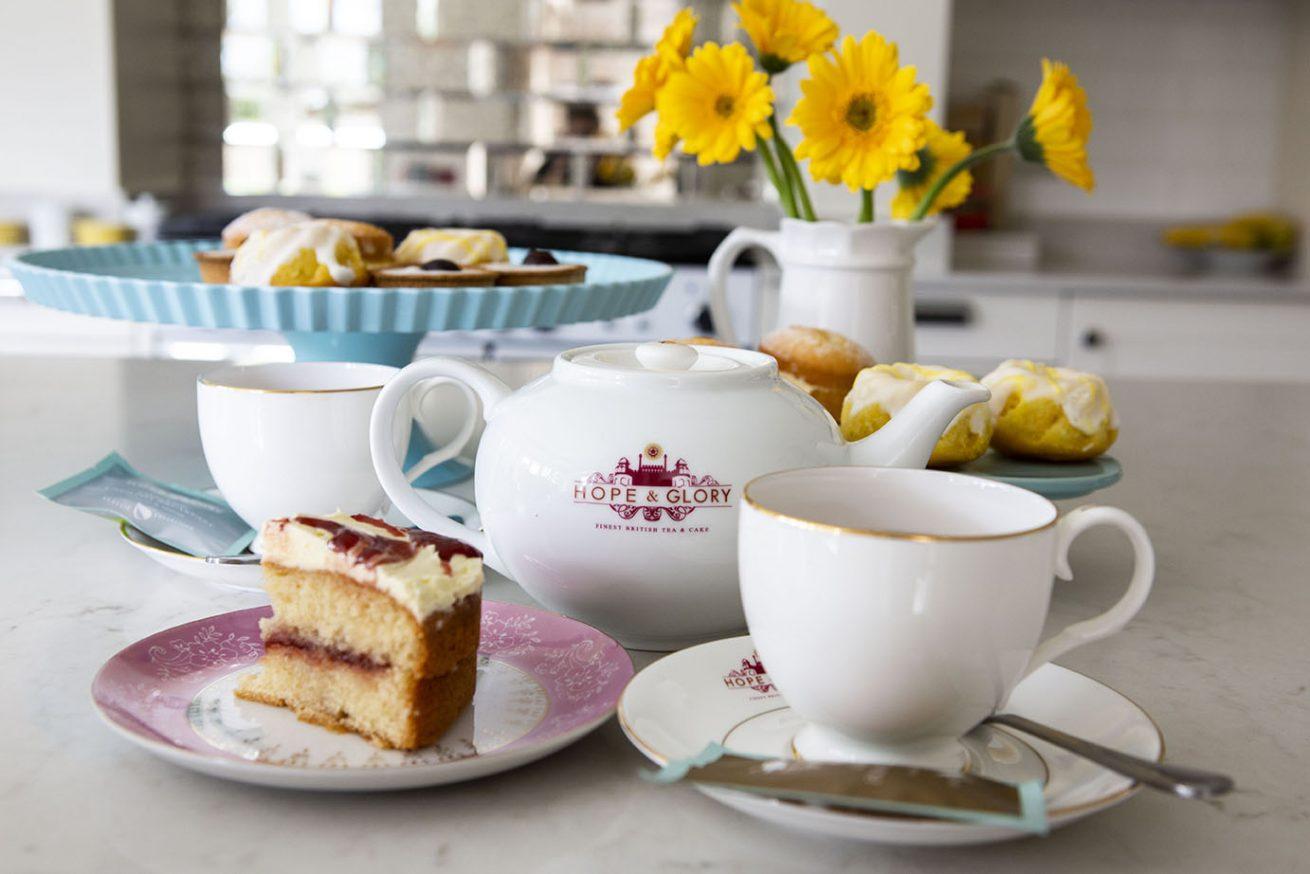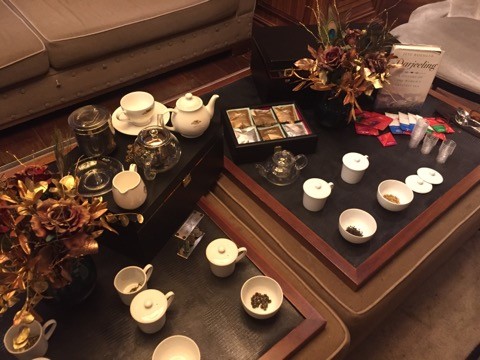Putting a shine on your tea service

How do you create a stand-out tea experience for your customers and guests? Bharat and Nina Chudasama of Hope & Glory Tea offer some clues.
Summer got off to a great start. News reached Bharat and Nina Chudasama that one of their clients, a famous London hotel, had just won Britain’s ‘Best Tasting Tea’ at the 2019 Afternoon Tea of the Year Awards. As founders of the hotel’s organic tea brand of choice, Hope & Glory, the Hertfordshire-based couple basked in the afterglow.
‘We were thrilled at the judges’ decision, especially for our client,’ says Bharat, who is also Hope & Glory’s Tea Master. ‘Obviously, it reflects well on Hope & Glory, and proves that one tea at a time, we’ve started to make a difference by offering what we believe is the best tea in the world, and doing all we can to elevate the tea experience. It also proves that our decision to personally visit and source directly from mostly small and independent tea gardens is the right one. To an extent, we’ve been able to see and control how all our teas are grown, harvested and processed to yield superior quality and flavour.’
Passing on this assurance – and consistency — to their clients has helped to build trust in the company behind premium, organic, whole-leaf Hope & Glory Tea. Whether mighty household names, SMEs or start-ups, all hope to amplify their tea service by working with Bharat and Nina. ‘Our ethos is we don’t just sell our clients the very best tea that is delicious and grown and packaged sustainably, we also make sure we equip them with the tools to offer a tea service that enhances their image as a business,’ says Nina.
Bharat and Nina want to restore the glory days of tea drinking in Britain, where it has always been more of a ritual conducive to conversation and creating connections than the strictly choreographed ceremonies of China and Japan. They envision a world where customers and businesses alike take the tea experience seriously enough to acquire a deep knowledge of its finer details.
A good way to start, they suggest, is by following the commandments enshrined in their ‘7 Steps for a Perfect Brew’.

‘The 7 steps are the details that make a great tea experience, and are the foundations of the tea service across cultures, even if the nuances of tea drinking may vary from one culture to the next,’ says Bharat. ‘First, do you have the right tea, in terms of origin and quality? What about the quality of your water, and are you brewing your tea to the right temperature? Are your vessels fit for purpose whether porcelain, simple ceramic or glass and match the tea being served? Finally, you have to know the correct accompaniments for certain teas. Milk, sugar or both?’
Nina believes that a good tea service hinges equally on the knowledge and understanding that comes with good training. She recalls the period in British history, circa the sixteenth and seventeenth centuries, when tea was so precious a commodity that it had to be kept under lock and key. Then, the genteel art of serving tea relied not only on the type of tea served and how it was poured by each host, but also on the skills of those who prepared the tea table beforehand with the right equipage, including tea cups, teapots, and sugar bowls as well as the right foods.
Enter the Hope & Glory Tea Academy, a catchall for the range of tea consultancy services designed by Nina and Bharat to give clients regardless of size or sector an edge in the tea service stakes. Only businesses thinking about creating a tea experience as a differentiator in the marketplace need apply. The Hope & Glory Tea Academy offers robust tea training sessions, tutorials and tastings, and the provision of secret tasters or mystery diners to keep staff on their toes. Management then receives a full report at the end of what is an extremely rigorous process. Bharat and Nina also work with top chefs, such as Cyrus Todiwala OBE of Cafe Spice Namaste, to create tea-pairing menus that break the mould, such as their successful series of Bombay Afternoon Teas.
It’s an approach to delivery that if Bharat and Nina had their way would not be confined to the very top restaurants and hotels. Fortunately, as more establishments have started to differentiate themselves in terms of the quality of the wines and coffee they serve, a tea revolution which they see themselves leading should not be far behind. It’s a revolution built on judgement, competence and perception.
Says Nina, ‘Even before you think of offering a tea service, consider whether you’ve selected the right teas for your establishment. Are you a friendly cafe trying to deliver a very artisanal experience or are you a 5-star hotel set on delivering a very polished, refined experience? Have you trained your team properly so they can help customers to select their teas and answer questions? And do you look the part – do your staff wear the kind of uniforms that match the experience that you’re trying to deliver?’

Bharat agrees, ‘All those aspects of your tea service need to be thought through. For example, does your food menu go well with the tea menu? Is there that knowledge and understanding within the team to respond when customers ask what kind of tea they should offer and how they should drink it? A successful tea service really does touch upon every single component part of the business delivery if the aim is to create something memorable and attractive. Even micro-enhancements can make a huge difference.’
Earlier in the year, another Hope & Glory client offered a ‘magnificent’ tea service to a large gathering attended by a senior member of the Royal Family. ‘Based on the feedback we got, it was astounding. And the tea service, including the presentation of our teas themselves, was so well set up. But that’s all down to training,’ says Bharat. The same client is also tapping the potential of tea to enhance business across all of the hotel’s food and beverage outlets; beautifully crafted Hope & Glory tea caddies add to the allure of the hotel’s bedrooms.
According to Bharat, even the classification of Hope & Glory teas into four distinctive collections – Classic teas, Nurturing, Signature and Light and Delicate — serves a purpose linked to the tea service. ‘We created those collections as an educational tool to make it easier for the customer, but we’ve also done it for the sake of businesses, so serving tea becomes like serving wine. If you’re ordering a red wine, you would ask to see the red wine list. Our classifications are a subtle navigation tool for staff to be able to inform and guide consumers in the right direction,’ he says.

The classifications also act as an aide memoir to advise customers on appropriate brewing times and temperatures. Nina points out that both Hope & Glory’s Signature and Classic collections, which include black teas such as Organic Assam, are always 5-minute brews, in one hundred percent boiling water. The Nurturing and Light and Delicate collections, which include Organic Jasmine Pearls, are 3-minute brews in 85-degree temperature.
Bharat says, ‘Not everyone can be a connoisseur or a tea sommelier but if you can keep those two temperatures and timings in mind, more often than not you’ll start to show your customers you understand a little about Tea. Such seemingly small enhancements can make all the difference between an also-ran and a truly stand out tea service.’
Article and interview by Gina McAdam
